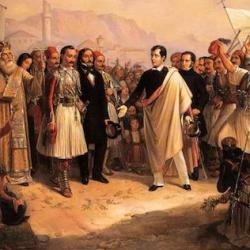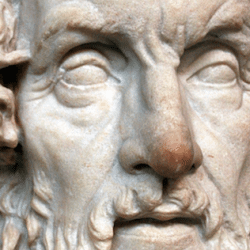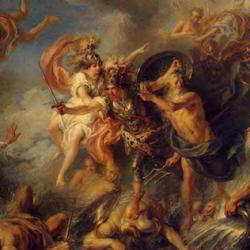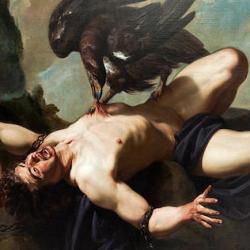Luc Brisson’s 2004 book, How Philosophers Saved Myths examines how both classical and Christian writers in antiquity employed allegorical interpretation to find meaning in ancient mythology. His opening pages offer a neat summary of the transition from poetry/myth-making to philosophy and history in ancient Greece. Writing, he argues, marks a key transition in this history. Poets, he notes, were not merely preservers of ancient traditions, but conduits or mediators between the mythical world beyond and the world of their societies. Poets not only spoke, but mimicked their subjects in various bodily ways, and “the ultimate goal of the mimesis performed by poets or their interpreters was to lead to the audience’s identification with the beings invoked.” In this way, the poet became the chief educator for his community, since he served as “the privileged intermediary between a community and the systems of explanations and values to which this community adhered.”
Writing introduced, Brisson suggests, six key changes in mental and cultural habits: 1) Prose replaced poetry as the preservation of information became less and less dependent on individual memory, which was aided by the rhythms and repetitions of poetry. 2) Narrative came to be “relayed or replaced” by description and even more by argument, and each portion of an argument came to be seen as semi-autonomous units. 3) In place of a past founded on the authority of a poet who depended on the Muses, historians increasingly supported their accounts of the past on eyewitness testimony. 4) Conceptual thought became more prominent, in the sense that qualities such as justice came to be seen as “autonomous realities” rather than as a property of actions or persons. Detached from particular actions and formed into a concept, “justice” and other concepts could be used to judge acts of a community or individual. 5) Writing favored critical thinking, in that it involved written documents that might be studied and examined repeatedly for internal contradictions, and that could be compared with other documents in the same field. Brisson says that “it ahd been impossible to ‘check’ the last version of a myth, whose truth was guaranteed by the Muses.” 6) Once liberated from memory and the muses, an avenue was opened for the critique of the poet’s status and function, and a critique of earlier writers in philosophy and history. In short, writing made possible an “Enlightenment” attitude, an attitude of critical inquiry.
Yet, this critique did not involve a wholesale rejection of poetic authority or the poet’s role. On the one hand, philosophers employed allegory to preserve the authority and insight of myth by recourse to a non-literal level of analysis. On the other hand, Greek cities preserved myths through tragedy, which functioned in various ways to reinforce the values of the city.
Plato, in Brisson’s account, made several moves that were decisive for the formation of the philosophical discourse that challenged and ultimately replaced poetic discourse. First, Plato “radically challenged the status of appearing.” Sensible things are not, for Plato, means for evoking a world beyond; rather, the sensible is simply an image, a simulacrum, of the world of intelligible forms. Yet, at the same time, even knowledge of the world beyond is described as a kind of “sight,” though it is an intellectual gaze that looks at the Ideas (itself derived from a verb meaning “see”) rather than a sensible gaze that looks at the images of the Ideas. Second, Plato shifted the meaning of sophia, wisdom. Prior to Plato, sophia had the same wide connotation as the Hebrew hokma: “To be sophos . . . is to dominate one’s activity, to dominate oneself and to dominate others. This is why a carpenter, a doctor, a diviner, a poet, a rhetor, a sophist, and the like could be labeled sophoi .” Anyone who learned a craft through apprenticeship to a master had learned a form of sophia. The philosophos is one who has completed an apprenticeship in a particular form of wisdom. Plato, however, sees philosophia as a transcendent form of wisdom, an “aspiration to a sophia transcending human possibilities in that its ultimate goal is the contemplation of a domain of objects, the world of intelligible form, of which the world of sensible things – into which the human soul has temporarily fallen – is only a reflection.” Third, this transcendent form of sophia is linked with a distinction between being and becoming. Other forms of sophia pertain to the changing world of the sensible, but the unchanging world of Being. The philosopher, Socrates says in the Phaedrus, strives toward “the knowledge of that which is truly being.” Becoming is also assimilated to appearing, the changing world of becoming thus rendered as a shifting image of the unchanging world of being, which is reality and not mere appearance. Poets and arists, who are only concerned with the sensible images of the intelligible, are inferior to the philosopher, since they are “makers of images of images.”
Much more in this suggestive book. But enough for now.














